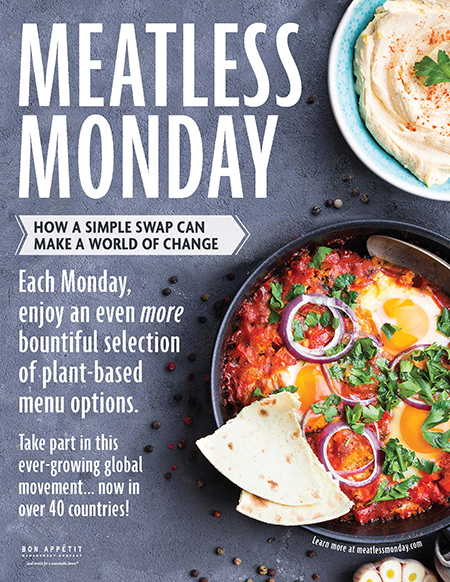Going Meatless
Since starting my fellowship with Bon Appétit, I have become increasingly — sometimes painfully — aware of animal agriculture’s impact on the environment. The facts are frightening and undeniable.
 In fact, a 2009 World Watch report found that animal agriculture likely accounts for a staggering 51 percent of human-caused greenhouse gas emissions. Producing meat is also resource inefficient: 1 calorie of animal protein takes about 25 calories to produce, compared to plant proteins, which require approximately 2.2 calories for every 1 calorie they provide. Raising livestock is also a massive drain on water resources, land, and crops that could be used to feed hungry people.
In fact, a 2009 World Watch report found that animal agriculture likely accounts for a staggering 51 percent of human-caused greenhouse gas emissions. Producing meat is also resource inefficient: 1 calorie of animal protein takes about 25 calories to produce, compared to plant proteins, which require approximately 2.2 calories for every 1 calorie they provide. Raising livestock is also a massive drain on water resources, land, and crops that could be used to feed hungry people.
Despite the damning evidence against animal agriculture, I’ve long struggled with the idea of eliminating animal products from my diet. Food is my career and my passion, and adhering to a strict vegetarian or vegan diet feels limiting. As an avid baker, I bristle at the idea of replacing a beautiful local butter with some mass-produced chemical substitute. I can certainly wrap my mind around the idea of cutting back on meat, but I’m just not sure I can commit myself to a life without cheese plates, or burgers fresh off the grill, or my stepdad’s utterly perfect paella.
Not only do I struggle with cutting out meat from a culinary standpoint, but over the years I’ve encountered many examples of animal agriculture that I felt great about supporting. While the mainstream factory farm system undeniably harms people, animals, and the earth, the practices of many small- and mid-size farms couldn’t be further from that stereotype. I’ve met farmers who have been true stewards of the earth, mindful of their impact and caring towards their animals. To me, the most sensible and realistic solution has been to focus on eating less meat and choosing options raised in better conditions, rather than cutting out meat entirely.
I’m not the only one. More and more people are choosing semi-vegetarian or “flexitarian” diets that focus on reducing consumption of animal products rather than cutting them out entirely. Perhaps the best-known symbol of flexitarianism is the Meatless Monday movement, which encourages consumers to cut out meat one day a week — usually Monday, which tends to be the day when people are most amenable to positive behavioral changes.
We found that our chefs’ culinary talents are the most effective tools we have to encourage more guests to go meatless.
Meatless Monday began in 2003 in association with the Johns Hopkins Bloomberg School of Public Health as a component of their Monday Campaigns public health initiative program, which also encourages other behavioral changes, including smoking cessation and exercise. Although Bon Appétit Management Company has long supported clients who want to run Meatless Monday campaigns, we’ve not made doing so a companywide requirement because our everyday food standards already require that vegetarian options be plentiful at every meal. We like to say that we do Meatless Monday through Sunday.
The Meatless Monday campaign’s concerted effort to highlight vegetarian options along with educating guests about the impact of their dietary choices is a valuable one. In 2017, Bon Appétit partnered with the Johns Hopkins Center for a Livable Future (CLF) to better understand how Meatless Monday is being deployed at Bon Appétit cafés around the country and to compile best practices and lessons learned by our chefs and managers. Manager of Strategic Initiatives Nicole Tocco Cardwell and I worked with CLF to poll our teams and compile the results into a guide to help the teams launch effective Meatless Monday programs in partnership with their campus communities.
What did we learn? Like most successful marketing campaigns, the best Meatless Monday campaigns are grounded in collaboration with other interested groups on campus, focused on educating guests about the intent and impact of decreasing their meat intake, and strengthened by meaningful face-to-face interactions between our teams and their campus communities. Most of all, we found that our chefs’ culinary talents are the most effective tools we have to encourage more guests to go meatless. At the end of the day, everyone just wants to eat something delicious, and if it happens to be meatless, so much the better.
I doubt that I’ll ever want to cut out meat completely from my diet, but I can recognize it for what it should be — a rare treat. I imagine many of our guests feel the same way. But even for the most die-hard carnivores out there, the Meatless Monday campaign is a great reminder that setting your beloved burger aside even one day a week can lead to meaningful change.